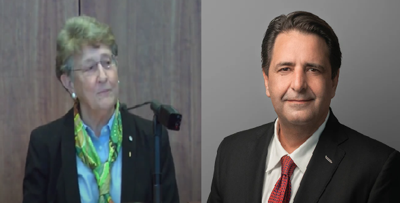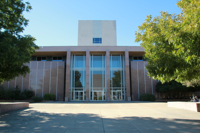
Jean Toal, left, and Peter Protopapas
COLUMBIA, S.C. - The judge overseeing South Carolina’s asbestos docket must explain why she appointed a local lawyer as receiver over foreign companies and report monthly on all receiverships, the state’s highest court said, delivering the first pushback on a former chief justice of the court who has taken an increasingly expansive view of her authority to push settlements of asbestos lawsuits.
The order requires Judge Jean Toal to explain, with evidence, why she is appointing a receiver in cases where there is no judgment against the target company and report on the more than two dozen receiverships she has authorized thus far with little public oversight.
Judge Toal has appointed Peter Protopapas, a local personal injury lawyer, as receiver to recover assets for asbestos plaintiffs under a contingency-fee agreement where he gets to keep a third of any money he obtains on behalf of usually defunct companies from their old insurers.
Judge Toal, the first female chief justice of the South Carolina Supreme Court, was appointed to the asbestos docket after she retired.
Judge Toal’s receivership practices came under heavy fire after she began appointing Protopapas as receiver over out-of-state and foreign companies that say they never did business in South Carolina or never had judgments against them. One of those companies, Altrad Group, won a $1.3 million sanctions order and global injunction against Protopapas from a U.K. court, which found he was illegally interfering in Altrad’s business. Altrad is a multibillion-dollar industrial services company whose Cape unit once mined asbestos in South Africa.
Protopapas claims to be in charge of Cape as receiver and has used that position to sue international mining giants Anglo American and DeBeers under a theory they conspired to evade U.S. liability for asbestos damages. Anglo American, DeBeers and various insurers have repeatedly sought to dissolve the purported receivership, arguing South Carolina law doesn’t allow it and Judge Toal has no jurisdiction over them.
The South Carolina Supreme Court granted review of Altrad’s petition and sent the case back to Judge Toal to reconsider under guidelines the court established in a May decision involving a Canadian asbestos company. In that decision, known as Welch, the high court said receiverships should be imposed only in the “rarest” and “most extraordinary cases” before any judgment has been obtained.
The court also suggested the receiver’s power stops short of giving him “entry into the boardroom,” which would preclude him from suing other companies in Cape’s name without Altrad’s approval.
Court-appointed receivers are normally installed to protect assets that are in danger of being dissipated before a judgment can be paid. Judge Toal started by appointing Protopapas to collect from insurance policies issued years before to long-defunct companies, under a theory those policies covered workplace asbestos exposures that took decades to manifest themselves.
But instead of collecting money to pay judgments, she has allowed Protopapas to store it in secretive Delaware partnerships, apparently to pay settlements he negotiates in the future.
Protopapas has taken in tens of millions of dollars through these arrangements, including millions of dollars in fees for himself. Most of his settlements involve convincing insurers to “buy back” policies and theoretically end any further asbestos liability.
Judge Toal then expanded the practice to include out-of-state and foreign companies, encountering stiffer resistance each time she pushed the boundaries. A federal court in New Jersey blocked Protopapas from trying to prevent a New Jersey company from filing Chapter 11 bankruptcy.
And Altrad, Anglo American and DeBeers have asked the state Supreme Court to dissolve the purported receivership over Altrad’s Cape subsidiary for a variety of reasons including lack of jurisdiction.
In previous filings, they have complained Judge Toal appointed Protopapas in a case that had already been settled, then morphed his receivership into another case without ever issuing an appointment order or obtaining a judgment to enforce.
In its June 26 order, the South Carolina Supreme Court ordered Judge Toal to file an appointment order in each case where Protopapas has been authorized to work, based on evidence the target company is squandering or hiding assets. The receiver also must comply with the restrictions under Welch, the court said, which presumably would preclude Protopapas from filing lawsuits and collecting money on behalf of Cape without the approval of Altrad directors.
The court also ordered Judge Toal to rule on a long-pending motion to dissolve the receiverships and another one by international law firm Locke Lord for her to reconsider her order authorizing Protopapas to operate in cases where she hadn’t actually appointed him.
Protopapas has used his position as receiver to sue law firms who oppose him, in one case extracting a $5 million legal malpractice settlement from a local firm that fought his efforts to take control of its client company.
The pushback from the Supreme Court represents a change in tone for a generally pro-plaintiff bench. Previously, it called Altrad’s legal actions in the U.K., where it is subject to court jurisdiction, as “shocking to American eyes.”
The court even delivered an apparent rebuke to Protopapas, threatening to punish unnamed lawyers for what it called “unnecessarily antagonistic” filings and “sniping… on matters that have nothing to do with the merits.” Protopapas, in a recent motion for sanctions, accused Altrad’s lawyers of “contemptuous behavior” that “cast a dark shadow on the integrity of our legal system.”
“Appeals will be summarily dismissed” or sanctions ordered, the court said, “if any party continues with this inappropriate behavior.”








